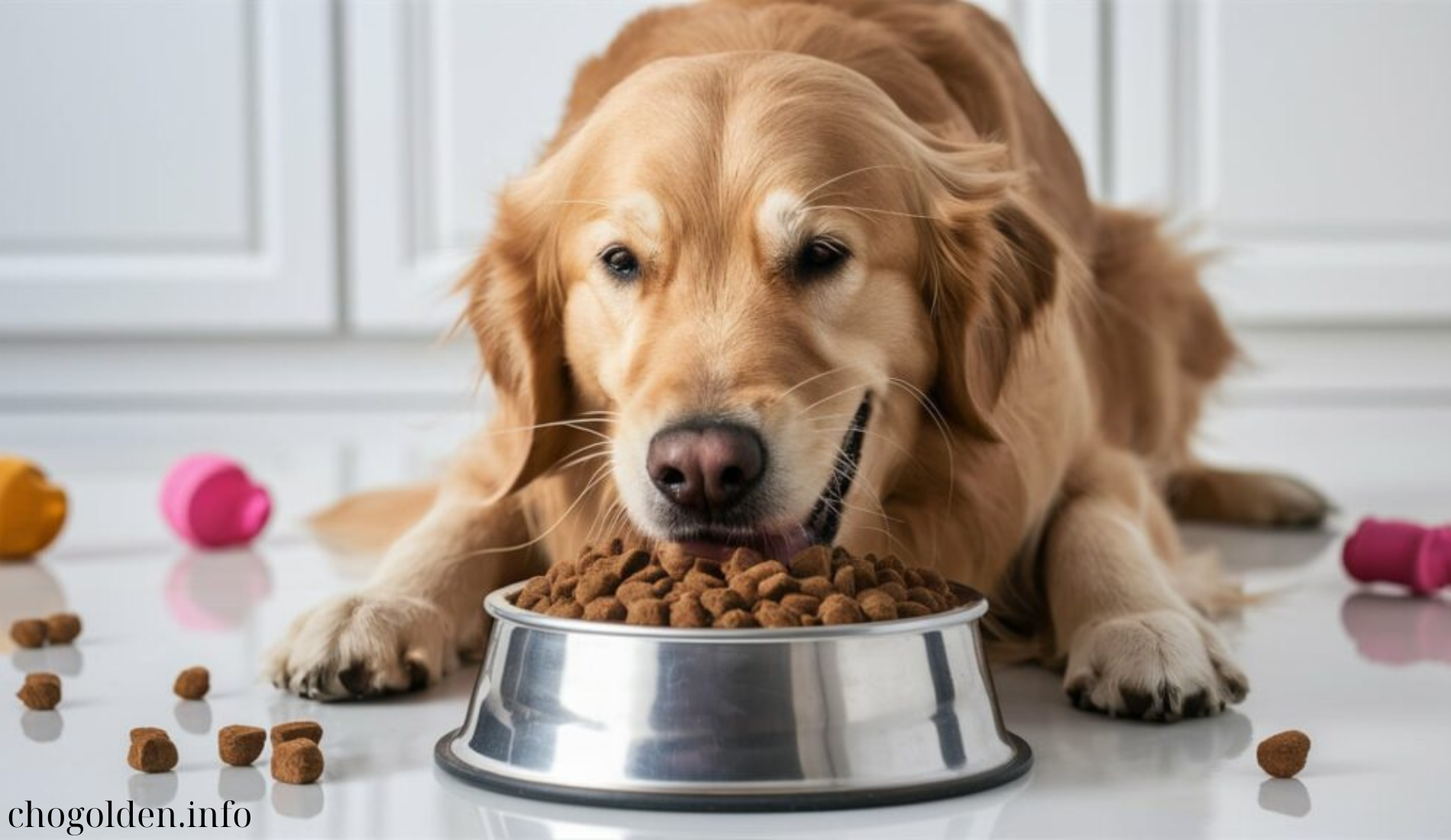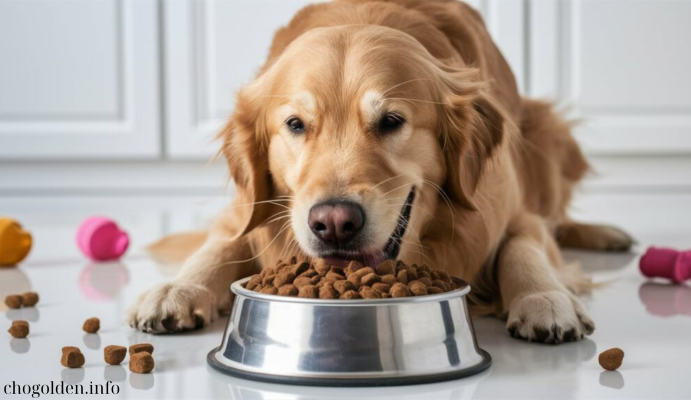Golden Retrievers, known for their friendly and energetic demeanor, require a well-balanced diet to maintain their health and vitality throughout their lives. The right food can support their coat condition, energy levels, and overall well-being. Here’s an expert guide on selecting the best food for Golden Retrievers, covering essential nutritional elements, top recommended brands, and special dietary considerations.
1. Essential Nutritional Elements for Golden Retrievers
A. High-Quality Protein
1. Importance of Protein: Protein is crucial for maintaining muscle mass, repairing tissues, and supporting overall body function. Golden Retrievers should have high-quality animal proteins as the primary ingredient in their food.
2. Recommended Sources: Look for foods where chicken, beef, lamb, or fish are listed as the first ingredient. Aim for a protein content of around 20-30% of the total diet, depending on your dog’s age, activity level, and health status.
B. Healthy Fats
1. Role of Fats: Fats provide energy and support skin and coat health. Omega-3 and Omega-6 fatty acids are particularly important for maintaining a shiny coat and supporting joint health.
2. Recommended Sources: Foods containing fish oil, flaxseed oil, and chicken fat are excellent sources of healthy fats. These ingredients help in reducing inflammation and promoting overall health.
C. Balanced Carbohydrates
1. Importance of Carbohydrates: Carbohydrates supply energy and aid in digestion. Choose foods with easily digestible sources like sweet potatoes, brown rice, and oats.
2. Avoid Excessive Fillers: Minimize foods with high levels of corn and soy, as they can contribute to allergies and digestive issues.
D. Essential Vitamins and Minerals
1. Vital Nutrients: Essential vitamins and minerals support various bodily functions, including bone health, immune function, and metabolism. Look for a balanced mix of vitamins A, D, E, and B-complex, as well as minerals like calcium, phosphorus, and potassium.
2. Supplement Considerations: Depending on your Golden Retriever’s health, supplements such as glucosamine and chondroitin may support joint health, especially in senior dogs.
2. Top Recommended Brands for Golden Retrievers
A. Royal Canin
1. Breed-Specific Formulas: Royal Canin offers breed-specific formulas tailored to Golden Retrievers. These recipes include balanced nutrients to support skin health, coat shine, and overall vitality.
2. Nutritional Balance: Their formulas provide appropriate levels of protein, fats, and carbohydrates, along with added vitamins and minerals to support joint health and immune function.
B. Hill’s Science Diet
1. Quality Ingredients: Hill’s Science Diet is known for its high-quality ingredients and balanced nutrition. Their large breed formulas include chicken as the main protein source and promote healthy digestion and muscle maintenance.
2. Age-Specific Options: They offer specific formulas for puppies, adults, and senior dogs, ensuring age-appropriate nutrition to support each life stage.
C. Blue Buffalo
1. Natural Ingredients: Blue Buffalo prides itself on using natural ingredients and avoiding artificial additives. Their formulas feature high-quality meats, whole grains, and fresh fruits and vegetables.
2. Special Diets: Blue Buffalo offers grain-free and limited-ingredient diets for dogs with food sensitivities or allergies, providing options that cater to special dietary needs.
D. Orijen
1. Biologically Appropriate Diet: Orijen provides a biologically appropriate diet that mimics the natural diet of wild canines. Their recipes feature a high-protein, grain-free approach with fresh, regional ingredients.
2. Nutrient-Rich Formulas: Their formulas include a diverse range of meats and fish, ensuring a rich source of protein and essential nutrients.
3. Special Dietary Considerations
A. Allergies and Sensitivities
1. Identifying Allergies: Golden Retrievers can be prone to food allergies or sensitivities. Common allergens include grains, chicken, and beef. If you notice symptoms like itching, gastrointestinal issues, or ear infections, consider a limited-ingredient or hypoallergenic diet.
2. Consult a Veterinarian: Work with your veterinarian to identify any food allergies and select an appropriate diet tailored to your dog’s specific needs.
B. Weight Management
1. Preventing Obesity: Golden Retrievers are prone to obesity, which can lead to health problems like joint issues and diabetes. Choose a food that supports weight management and monitor your dog’s caloric intake.
2. Regular Exercise: Complement a balanced diet with regular exercise to help maintain a healthy weight and promote overall fitness.
C. Age-Specific Needs
1. Puppies: Golden Retriever puppies require a diet rich in protein, fat, and essential nutrients for growth and development. Look for puppy formulas that provide the appropriate levels of these nutrients.
2. Seniors: Older Golden Retrievers may benefit from formulas designed to support joint health, cognitive function, and reduced calorie intake to manage weight.
4. Transitioning to a New Food
A. Gradual Transition
1. Importance of Transitioning: When introducing a new food, gradually transition over 7-10 days to avoid digestive upset. Mix the new food with the old food, gradually increasing the proportion of the new food.
2. Monitoring: Watch for any changes in your dog’s stool consistency or behavior during the transition. Adjust the process as needed based on their response.
B. Consult Your Veterinarian
1. Professional Guidance: Always consult your veterinarian before making significant changes to your dog’s diet. They can provide personalized recommendations based on your Golden Retriever’s health, age, and specific dietary needs.
2. Regular Check-Ups: Schedule regular veterinary check-ups to ensure your Golden Retriever’s diet continues to support their health and well-being.
Conclusion
Choosing the best food for Golden Retrievers involves understanding their unique nutritional needs and selecting high-quality products that support their health and vitality. By focusing on key nutritional elements such as protein, fats, and carbohydrates, and opting for reputable brands, you can ensure your Golden Retriever receives a diet that promotes optimal health. Special dietary considerations, such as managing allergies, weight, and age-specific needs, further enhance their well-being. Consulting with your veterinarian and making gradual dietary transitions will help keep your Golden Retriever happy and healthy throughout their life.
FAQ
What protein sources are best for Golden Retrievers?
High-quality animal proteins such as chicken, beef, lamb, or fish are ideal for Golden Retrievers. They provide essential amino acids for muscle development and overall health.
How much food should I give my Golden Retriever?
Feeding amounts depend on your dog’s age, weight, activity level, and metabolism. Follow the feeding guidelines on the dog food packaging and consult with your veterinarian for personalized recommendations.
Are there any foods Golden Retrievers should avoid?
Avoid foods with excessive fillers like corn and soy, as well as ingredients that may cause allergies or sensitivities. Also, refrain from feeding them human foods that are toxic to dogs, such as chocolate, grapes, and onions.
How can I tell if my Golden Retriever has a food allergy?
Signs of food allergies include itching, gastrointestinal upset, and ear infections. If you suspect an allergy, consult with your veterinarian to identify the allergen and select an appropriate diet.
What are the benefits of a grain-free diet for Golden Retrievers?
A grain-free diet may benefit Golden Retrievers with grain sensitivities or allergies and can be suitable for dogs with digestive issues or those needing a diet closer to their natural, ancestral diet.

